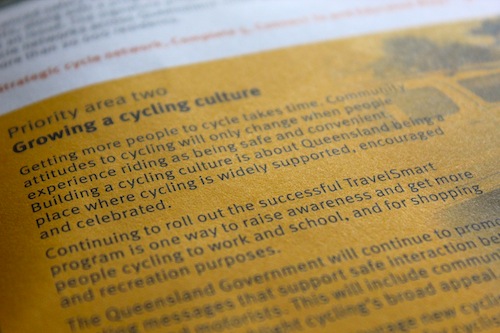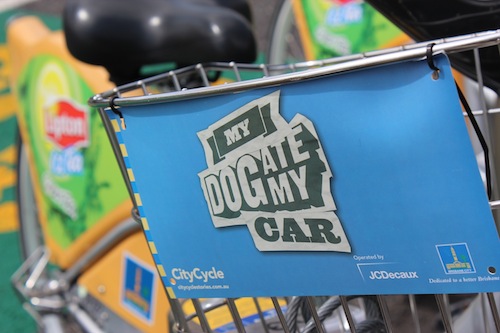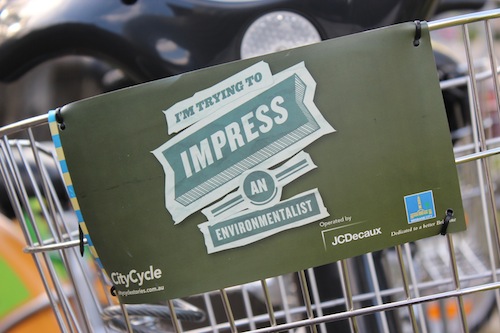Branding Bikes
22 October 2011
According to the Queensland Cycle Strategy 2011-2021, one of the state government’s four priorities regarding cycling is to make Queensland “a place where cycling is widely supported, encouraged and celebrated”.

As part of a revamp in August, Brisbane’s CityCycle scheme launched a marketing campaign called CityCycle Stories, the premise of which being that “[e]veryone has a different CityCycle story to tell”. The campaign presents five such stories, and cyclists are invited to add their own (only via facebook, but that’s another story).
Whatever the actual effect advertising has on community perceptions of cycling, this sounds like a good opportunity for the council to support, encourage and celebrate cycling. In the same way, though, a poor campaign has the power to ridicule, discourage and denigrate cycling. That’s my concern.

For this panel, why is someone cycling? Only because they can’t drive their car. Indeed, the logic of this situation is that only the most ridiculous circumstance could stop someone from driving their car—under normal circumstances there is no excuse (not to drive).

Here the campaign comes closest to endorsing a sensible reason for riding a bike, namely that relative to other forms of transport, it’s less polluting (again, taking driving as normality is problematic, I’m unsure of how the environmental comparison between cycling and public transport works out, walking is the ideal). But even here, the campaign displaces a concern for the environment to someone else (how quirky!). We should ride bikes, not because we give a shit about the environment, but because it gives us a chance to get some jollies out of some other that does.
The rest are similarly dumb, see them here. It’s interesting to compare the tone of the CityCycle campaign with one from the SA Motor Accident Commission that’s been widely condemned for beating up on cycling. I wouldn’t be at all surprised if they were produced by the same agency.
Of course, council doesn’t have to play by the state’s rules vis-à-vis cycling culture, but that doesn’t mean they shouldn’t. On a purely pragmatic point, promoting a bike hire scheme by making fun of its users is just foolish.
Politicians. Twitter.
2 June 2011
I enjoy interacting with organisations and politicians on twitter. It allows access to quick, pertinent information that I don’t think would be possible through a telephone or email. As with any mode of communication, success depends on both ends knowing how the medium works. @brisbanecityqld is a good example of a productive organisational account. I’ve also heard good things about Premier Bligh’s @TheQLDPremier. These two work because someone has decided to take twitter seriously as a medium to communicate with the public, and has been adequately resourced to do so.
On the other end of the spectrum, the account of one politician recently couldn’t articulate a policy position, because their ideas ‘won’t fit into 140 characters’. Here, a well run campaign, or just a politician who understand the web, could defer to a medium which does not hold such a limit. But this didn’t happen, so there was a breakdown.
If we do operate in a world where politicians are professionals in the narrow field of appealing to voters, taxpayers or business, then political parties need to ensure that they are not left unsupported in domains that they don’t understand (here, the internet). Perhaps this is ridiculous idealism, but I would like for the people running the council, state or country to have a broader expertise and be able to respond when questioned by a citizen, because they are intelligent and capable individuals in their own right. Maybe it is fair to insist that agents of the state are literate in modern communication platforms, consider all that they demand of us.
Soot
30 April 2011
Every time it rains, the particulate matter that’s been collecting on the side of our building gathers where water can sit. This means that our balcony gets covered in soot.

Solid exhaust products from cars and trucks receive less attention than gaseous expulsions, for a number of climate-change-related reasons (atmospheric longevity, the rhetorical benefits of singling out CO2, geography, &c.). Unlike climate change, people have been conscious of black carbon air pollution for centuries. As a young westerner, my experience of soot is mostly aesthetic. More concretely, it shortens lives globally on a mammoth scale. Even if engineers can ‘fix’ the climate, pollution will still be an issue to confront.